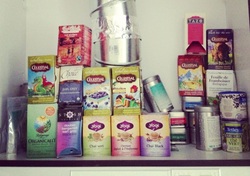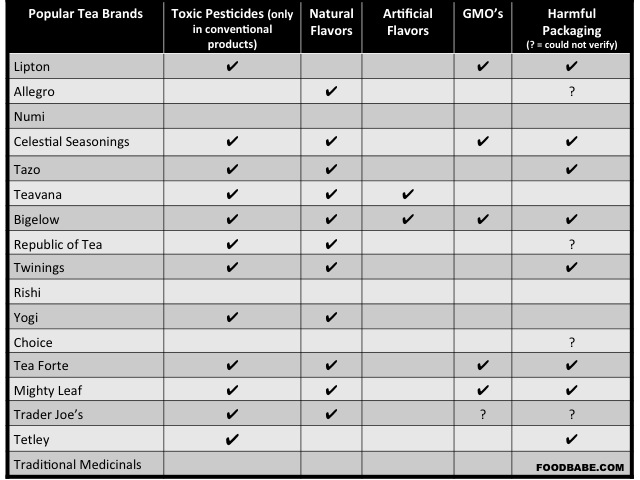
We hear about it all the time; tea is loaded with anti-oxidants and cancer fighting benefits. “Drinking just one cup of tea daily can reduce your chance of bla bla bla by 50 %..”. While many of these benefits may be true, there is also information that is often overlooked which reveals some toxic facts about the common tea brands. Do the cons outweigh the pros when it comes to drinking tea? When teas are laden with cancer-causing pesticides does it make a difference for the tea to have cancer-fighting properties? Therefore do the toxic properties cancel out the beneficial properties? Being an avid tea consumer I was very shocked and disappointed to find out that some of my favourite brands of tea were among the worst for pesticide levels. Many of these brands market their teas as being beneficial to your health, yet do nothing to control the toxins existing in the teas. Here is another clear-cut case of profit being put before people’s health.
A look inside my personal tea cupboard, just so you can appreciate how much I really love tea!
Let’s take a look at some of the tea brands that contain the highest pesticide levels. Celestial Seasonings is among the worst; this makes me especially sad because I’ve always loved this tea brand (you can probably tell by my extensive collection). There’s just something so whimsical about the name Celestial Seasonings… Anyway, in a study conducted by EuroFins (a worldwide analytic testing company) 91% of Celestial Seasonings teas contained levels of pesticides that exceed the US federal limits. Considering all of the other toxins and poisons that the FDA lets slide by, this is very alarming. When Celestial Seasonings started in 1969, it was “founded on the belief that all natural teas could help people live healthier lives.” Maybe that was the case in 1969 because there weren’t as many pesticides being sprayed, but in this day and age we have to be wary of the products we are consuming.
Other notable teas containing toxic pesticides include: Tetley, Bigelow, Mighty Leaf, Teavanna, Tazo, Davids Tea and many more. Not only do many of these teas contain these toxic pesticides, many of them contain artificial flavorings as well. Also, a popular way to mask undesirable sounding ingredients is to tent them under the umbrella of “natural flavouring,” any ingredient that comes from a natural origin falls under this category. So, additives such as: Castoreum (a chemical taken out of glands from a beaver that are located near the anus,) Carmine aka Natural Red #4 (made from dried and ground up Cochina beetles, gives foods a red color,) and many more. Just because something says all natural doesn’t mean that it is a good thing for you to consume. Be sure to thoroughly read ingredient labels before purchasing; be aware of what you’re putting into your body.
Here is a chart that includes some popular tea brands and indicates whether or not they contain pesticides and additives
A look inside my personal tea cupboard, just so you can appreciate how much I really love tea!
Let’s take a look at some of the tea brands that contain the highest pesticide levels. Celestial Seasonings is among the worst; this makes me especially sad because I’ve always loved this tea brand (you can probably tell by my extensive collection). There’s just something so whimsical about the name Celestial Seasonings… Anyway, in a study conducted by EuroFins (a worldwide analytic testing company) 91% of Celestial Seasonings teas contained levels of pesticides that exceed the US federal limits. Considering all of the other toxins and poisons that the FDA lets slide by, this is very alarming. When Celestial Seasonings started in 1969, it was “founded on the belief that all natural teas could help people live healthier lives.” Maybe that was the case in 1969 because there weren’t as many pesticides being sprayed, but in this day and age we have to be wary of the products we are consuming.
Other notable teas containing toxic pesticides include: Tetley, Bigelow, Mighty Leaf, Teavanna, Tazo, Davids Tea and many more. Not only do many of these teas contain these toxic pesticides, many of them contain artificial flavorings as well. Also, a popular way to mask undesirable sounding ingredients is to tent them under the umbrella of “natural flavouring,” any ingredient that comes from a natural origin falls under this category. So, additives such as: Castoreum (a chemical taken out of glands from a beaver that are located near the anus,) Carmine aka Natural Red #4 (made from dried and ground up Cochina beetles, gives foods a red color,) and many more. Just because something says all natural doesn’t mean that it is a good thing for you to consume. Be sure to thoroughly read ingredient labels before purchasing; be aware of what you’re putting into your body.
Here is a chart that includes some popular tea brands and indicates whether or not they contain pesticides and additives
With all this being said, you may be feeling a little down in the dumps, but don’t worry! There is an upside to all of this. There are some trustworthy companies that provide quality organic teas to its consumers by monitoring the amount of pesticides and also using sustainable farming methods and fair trade standards. Some of these include: Teatulia, Numi, Zhyna’s Gypsy Tea, Choice Organics, Traditional Medicinals, Rishi and many many more; you just have to look. Even though brands like this are a little more expensive than the conventional ones, it is well worth it. Not only will you be getting the full benefit that the tea has to offer, you will be supporting ethical, sustainable and organic farming practices. The more people that switch to brands like these, the greater push conventional brands will feel to start changing their practices and principles and get with the changing times!
Tea can definitely be a great way to boost your health. Black, green, white, oolong and pu-erh teas all come from the Camellia Sinensis plant that is native to China and India. These teas contain many anti-oxidants called flavonoids; the most potent of these are known as ECGC and can help against free radicals that can contribute to a variety of cancers and heart disease. Many herbal teas contain some pretty amazing health benefits as well, although they are not as beneficial as the teas that are coming from the Camellia plant.
Now that you have learned some of the truth behind your favourite teas, you can make a more informed and healthy choice when considering the many different types of teas that are available! I know I will… for the love of health and tea!
Much Love
Disclaimer to Consider: As stated on their website, Glaucus Research, their clients and/ or investors hold trading positions in the securities profiled on the site and therefore stand to realize significant gains in the event that the stock price rises or declines. We personally are not able to verify this study as 100% correct but felt that the results were still worth both noting and considering in the likelihood that they are indeed true.
Sources and additional information:
http://www.treehugger.com/slideshows/green-food/10-fair-trade-tea-brands-with-smart-sustainable-practices/
http://www.webmd.com/diet/features/tea-types-and-their-health-benefits?page=2
http://ecoyogini.blogspot.ca/2013/02/artificial-flavouring-in-davids-teas.html
http://www.mnn.com/food/healthy-eating/blogs/are-teavana-and-celestial-seasonings-teas-safe-to-consume
http://www.examiner.com/article/dangerously-high-pesticide-levels-found-celestial-seasonings-teas
http://foodbabe.com/2013/08/21/do-you-know-whats-really-in-your-tea/
Tea can definitely be a great way to boost your health. Black, green, white, oolong and pu-erh teas all come from the Camellia Sinensis plant that is native to China and India. These teas contain many anti-oxidants called flavonoids; the most potent of these are known as ECGC and can help against free radicals that can contribute to a variety of cancers and heart disease. Many herbal teas contain some pretty amazing health benefits as well, although they are not as beneficial as the teas that are coming from the Camellia plant.
Now that you have learned some of the truth behind your favourite teas, you can make a more informed and healthy choice when considering the many different types of teas that are available! I know I will… for the love of health and tea!
Much Love
Disclaimer to Consider: As stated on their website, Glaucus Research, their clients and/ or investors hold trading positions in the securities profiled on the site and therefore stand to realize significant gains in the event that the stock price rises or declines. We personally are not able to verify this study as 100% correct but felt that the results were still worth both noting and considering in the likelihood that they are indeed true.
Sources and additional information:
http://www.treehugger.com/slideshows/green-food/10-fair-trade-tea-brands-with-smart-sustainable-practices/
http://www.webmd.com/diet/features/tea-types-and-their-health-benefits?page=2
http://ecoyogini.blogspot.ca/2013/02/artificial-flavouring-in-davids-teas.html
http://www.mnn.com/food/healthy-eating/blogs/are-teavana-and-celestial-seasonings-teas-safe-to-consume
http://www.examiner.com/article/dangerously-high-pesticide-levels-found-celestial-seasonings-teas
http://foodbabe.com/2013/08/21/do-you-know-whats-really-in-your-tea/

 RSS Feed
RSS Feed